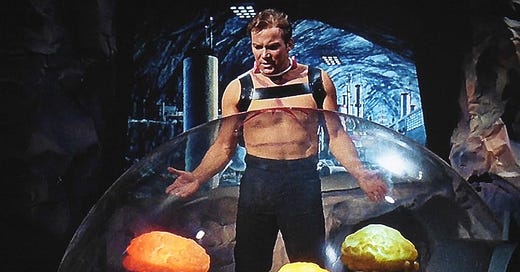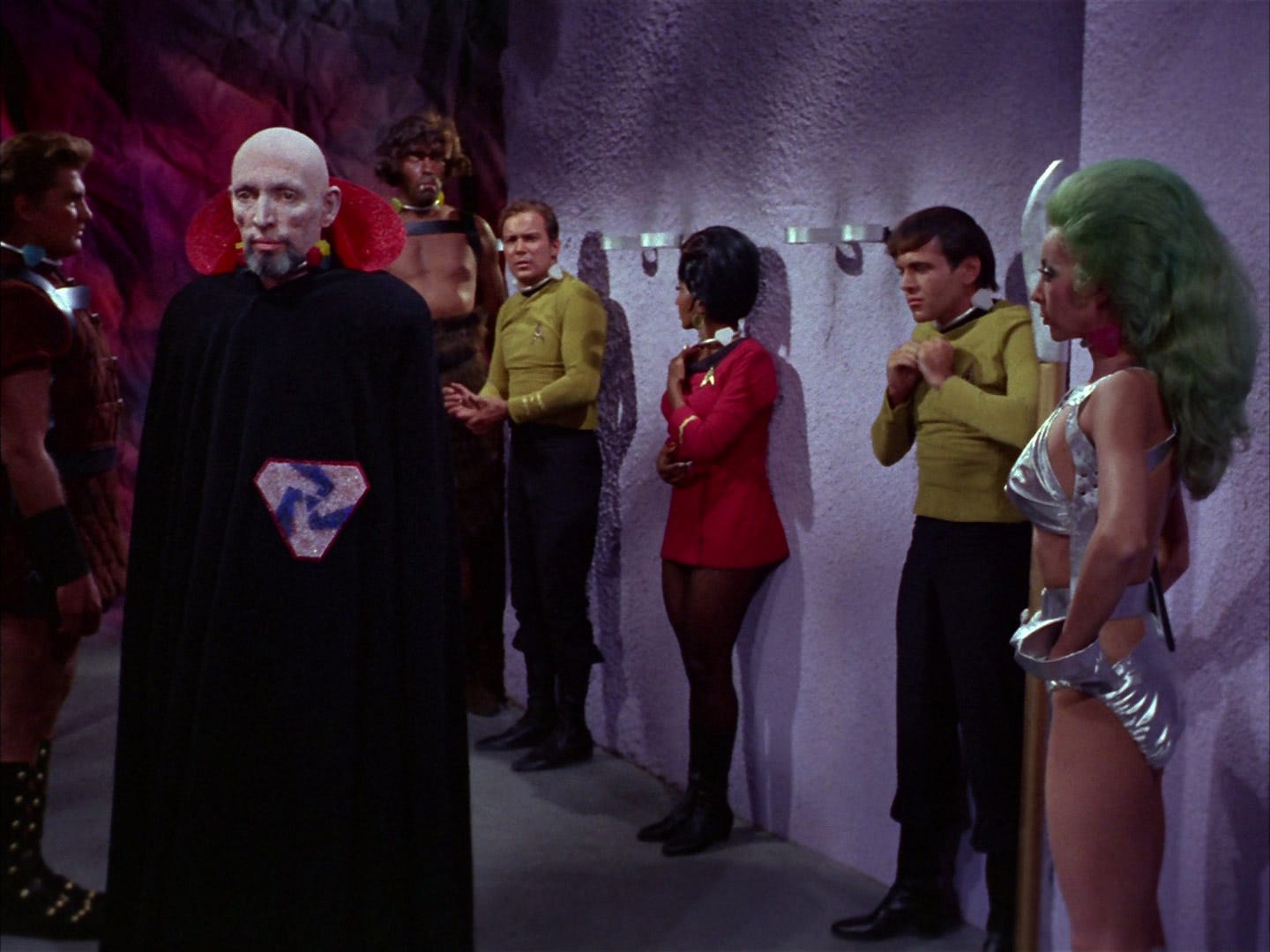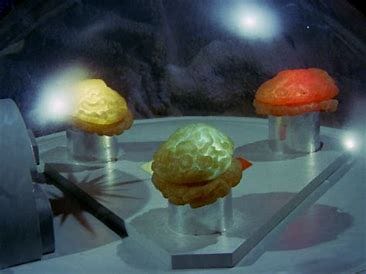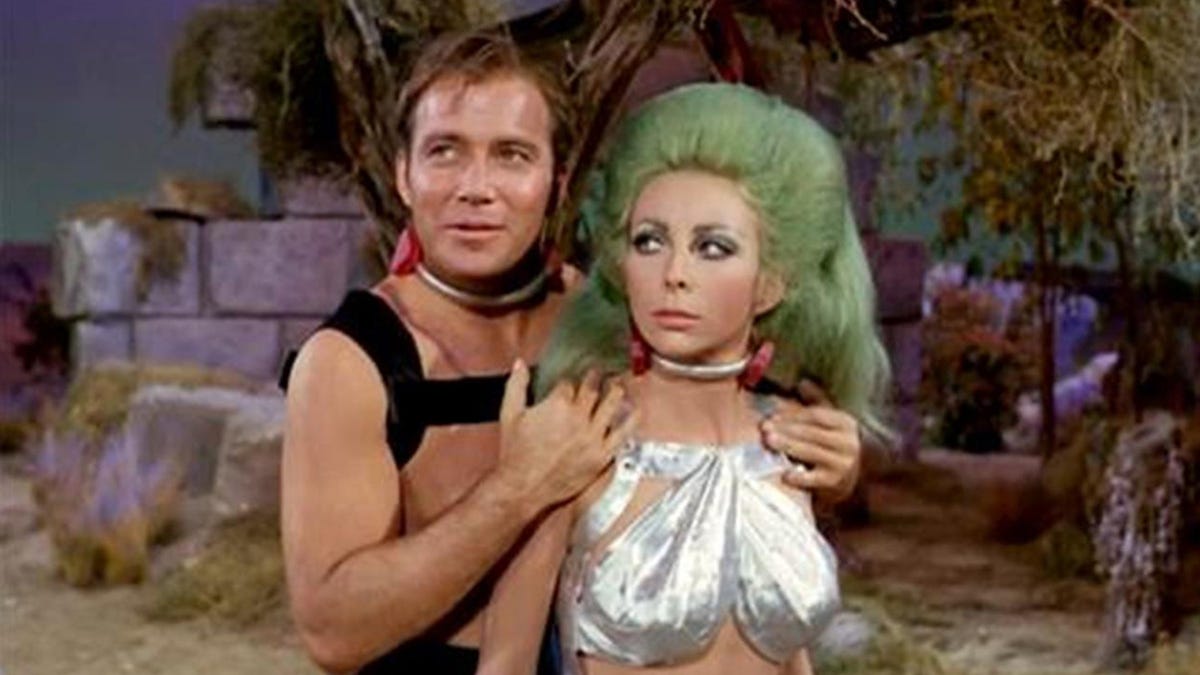"The Gamesters of Triskelion" - Season 2, Episode 16
"Provider One bids three hundred quatloos for the newcomers."
At this point, Star Trek has had as many confrontations with all powerful beings as there are crew members. It’s an easy set up, letting the crew confront impossible tasks and confront the Big Themes of religion, power, freewill, and the works. Making the ship fight god, God, or gods is useful; the set can be whatever it needs to be, the plot can realistically make any demand that could serve the themes. The challenge is to avoid telling the same story every time. Stories about all powerful beings can all too easily become basic morality tales about autocracy - “it’s bad!” - that are given new aesthetic dressing. You aim for “Charlie X” or “Who Mourns for Adonais?” but often end up in “The Apple.”
“The Gamesters of Triskelion” seems to be aiming for “Arena.” In that episode, the Enterprise was captured by all-powerful Metrons bent on punishing “lesser beings” that resolve problems with violence. Their punishment was to force the Enterprise and its Gorn combatants into a gladiatorial death match; an on-its-face absurdity that let the episode portray the hypocrisies of power - claims to moral superiority premised only on technological superiority - in an effective and fun way. In “The Gamesters of Triskelion,” three members of the Enterprise are captured by all-powerful Providers who force them into gladiatorial death matches. But this is not out of any moral superiority. The Providers are just flat out bored.
Master Thrall Galt explains the crew’s predicament. Galt was played by Joseph Ruskin, a character actor who had a longstanding relationship with the franchise. Ruskin appeared in three Deep Space Nine episodes as two different characters, a single episode of Voyager, the Next Generation film Star Trek: Insurrection, and an episode of Enterprise before his death in 2013.
Kirk, Uhura, and Chekov are the victims here, pulled out of beam transport onto the distant planet of Triskelion. As Spock, McCoy, and Scotty try to track them down, the three abductees are forced into explicit Romanesque slavery - as “thralls” - with a particular focus on combat. Their main captor, Master Thrall Galt, puts them into pain-inducing shock collars and begins to train them in the violence they’ll be expected to perform against their fellow thralls, made up of a motley crew of muscular humanoid aliens. The unseen, god-like “Providers” place bids for ownership of the fighters and bet on the outcomes of their fights. Additional context is kept at a minimum.
Instead, the episode largely devotes itself to Kirk’s flirty back-and-forth with the thrall warrior woman Shahna, assigned to train him in the Triskelion art of violence. Raised on Triskelion, having known only fighting and death and serving the Providers, she is a human racehorse. Through some florid monologues about freewill, physical beauty, the vastness of space, and the gift of love, Kirk woos Shahna into sympathy. It is not the most convincing romance - unaided by the wooden performance of Angelique Pettyjohn - but the Providers do not seem hard to please. They take an interest in Kirk, his libido is amusing it seems, and once Spock manages to track the crew down with some fancy science, Kirk is brought before the Providers to work out a solution.
The episode finally shows its hand here. Take a look:
The Providers, mere brains-in-vats, having long since evolved past the need for physical bodies and possessed of extrasensory powers, have grown so bored that they “athletic competition” is all that can interest them anymore. They bet “quatloos” on the outcomes of fights solely for bragging rights - what good could currency be to a disembodied being? - and find “athletic competitions [their] only challenge, the only thing which furnishes [them] with purpose,” with the odd absence of the word “vicarious.” Like the Metrons, they believe themselves “mentally superior” but “physically simple,” they make no mention of their morality and seem to believe their goodness inherent. Kirk pushes back on this - “murderers without the spirit to really wager for the lives you take.” - and offers them a final bet for the freedom of the Enterprise and the thralls: he’ll fight with it all on the line. The Providers agree, Kirk fights Shahna but spares her, and the Providers honor their deal to release the ship and educate their now-former slaves. The episode ends with Shahna - unsettlingly direct to camera - pledging that the thralls will one day follow Kirk to the stars.
The moment-to-moment of all of this is not the worst Trek and not the best. Gene Nelson - a former actor/dancer turned director - turns in his only episode of Star Trek here and goes for broke. The episode’s camera is energetic and aggressive, full of expressive zooms, handheld, and dolly work. Kirk’s desperate reach out from behind bars as he is first imprisoned, the run-up shot to his face as his torture collar is first activated, and a bevy of wide angle, overhead shots on the fight scenes and larger-than-average sets display a good, inventive eye for an action-forward episode. The camera’s energy, paired with the plot’s romance, serves a thematic goal as well.
Kirk explains the stars to Shahna, played by the evocatively named Angelique Pettyjohn. Pettyjohn, born Dorothy Perrins, began her entertainment career as a burlesque dancer before moving on screen in minor television and film roles, which often involved dancing. She starred in pornographic films throughout the 1980s - alongside roles in independent cinema classics like Repo Man (1984) and Biohazard (1985) - and was a regular fixture of the early Star Trek convention scene.
Scripted by Margaret Armen - one of only a handful of female writers for The Original Series - in her show debut, the episode displays an interest in bodies and sensation befitting such an energetic style. The Providers - having abandoned their bodies - are deprived of sensation entirely. They are forced to watch Kirk’s romance with bemused detachment, they are forced to make others fight for them, and the lack of feeling has caused a totalizing interest in probability and gambling. That is quite the statement. Without their bodies, they crave the only feeling available to them, the “zone” sought by machine gambling addicts that eliminates all sense of self and body in favor of simple reaction. In its depictions of all-powerful and uninhibited gamblers, “The Gamesters of Triskelion” produces an insight only recently articulated and studied in academic literature. Armen’s script is punching above its weight with the episode’s ultimate reveal.
The rest of the episode does not quite match up. The insight is backloaded; the reveal comes late and is more of a statement than an exploration. Once the reveal has passed, Kirk states much of the subtext of “Arena” - how can a being claim superiority when it has not evolved morally? - in a grand speech that convinces the Providers to take his big bet:
My people pride themselves on being the greatest, most successful gamblers in the universe. We compete for everything. Power, fame, women, everything we desire, and it is our nature to win. And for proof, I offer you our exploration of this galaxy.
Rather than challenge their gambling addiction, Kirk exploits it. His sincerity here is never clarified though, and the episode elides whether this challenge was merely perceptively opportunistic or a genuine, competitive challenge. But evidence suggests the later. The Providers honor their bet, Kirk plays by the rules, humanity’s competitive spirit triumphs in an even fight not out of cleverness but out of straightforward will. Is that as interesting as the alternative? I don’t think so. Is it more true to the human spirit? In all honesty, yes. Kirk is more Achilles than Odysseus this time around. “The Gamesters of Triskelion” may not be as successful as “Arena,” but it makes some bets that pay off all the same.
Stray Thoughts
The B-plot here consists of a few check-in scenes between Spock, McCoy, and Scotty as they try and track down where Kirk, Uhura, and Chekov could have gone. While they don’t factor in thematically, these scenes are strong. Armen has a good handle on Spock and McCoy’s dynamic in particular, their dialogue is snappy and combative, and Spock is assured of himself in the Captain’s chair in a reasonable, frictionable way. McCoy is baffled by Spock’s detached pursuit of the “best lead” despite how speculative it is, and Spock is willing to chase the most logical possibility regardless of how unlikely it may be. Without Kirk to mediate, their sparky back-and-forth is a lot of fun.
Of the 79 Original Series episodes, only 17 were totally or partially written by women. Margarate Armen would go on to turn in two more scripts for The Original Series and two more for The Animated Series, and consistently got scripts produced for other 70s television series like The Six Million Dollar Man, Wonder Woman, and Ironside.







